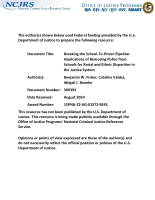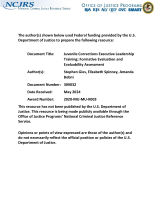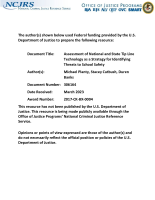Civil rights
Breaking the School-To-Prison Pipeline: Implications of Removing Police from Schools for Racial and Ethnic Disparities in the Justice System
Juvenile Corrections Executive Leadership Training: Formative Evaluation and Evaluability Assessment
Support Activities under Section 13(d) of Executive Order 14074: Workshops on Law Enforcement Use of Probabilistic DNA Technologies and Person-based Predictive Policing
A Statewide Mixed-methods Evaluation of Pennsylvania’s 8th Edition Sentencing Guidelines and their Impacts on Racial and Ethnic Disparities in Sentencing Outcomes
NIJ FY23 Center for Enhancing Research Capacity (CERC) at Minority Serving Institutions (MSIs)
Can Science Enhance Equity? Findings and Implications From a Study To Detect Bruising on Victims with Dark Skin Pigmentation
This plenary panel from the 2023 NIJ Research Conference features fascinating research on a methodology to improve the detection and documentation of bruises on victims of violence who have dark skin pigmentation. This study highlights the intersection between science, justice, and racial equity, featuring practitioner and victims’ advocacy perspectives. The discussion describes the research and its findings and explore strategies to ensure that this particular evidence-based methodology can be widely implemented by nurse practitioners in the field.
Participants:
See the YouTube Terms of Service and Google Privacy Policy
2023 NIJ Research Conference Opening Ceremony
The theme of NIJ’s 2023 Research Conference was “evidence to action,” and our goal was to bring researchers and practitioners together to learn about the latest research evidence and how it can be implemented to promote safety, equity, and justice.
The opening ceremony included remarks from U.S. Attorney General Merrick B. Garland, Assistant Attorney General for the Office of Justice Programs Amy Solomon, and NIJ Director Nancy La Vigne.
See the YouTube Terms of Service and Google Privacy Policy
Assessment of National and State Tip Line Technology as a Strategy for Identifying Threats to School Safety
Social Media and Domestic Radicalization
Social media has become a potent tool for spreading extremist beliefs and promoting violent extremism. NIJ Social Science analyst Aisha Javed Qureshi joins writer-editor Paul Haskins for a conversation about how scientific research is helping law enforcement and other agencies understand and address this growing concern.
Breaking the School-to-Prison Pipeline: Implications of Removing Police from Schoolsfor Racial and Ethnic Disparities in the Justice System
Firearms Regulation: A Historical Overview (From Crime and Justice: A Review of Research, Volume 28, P 137-195, 2001, Michael Tonry, ed. -- See NCJ-192542)
NIJ Multisite Impact and Cost-Efficiency Evaluation of Veterans Treatment Courts, Fiscal Year 2022
Deadline Notice
The deadline for the funding opportunity discussed in this video has passed.
See the YouTube Terms of Service and Google Privacy Policy
Breaking the School-to-Prison Pipeline: Implications of Removing Police from Schools for Racial and Ethnic Disparities in the Justice System
Building Trust Inside and Out The Challenge of Legitimacy Facing Police Leaders
In the face of budget cuts, changing workforce demands, new varieties of crime and new technologies, how should police executives manage officers and other personnel and still ensure that organizational goals are being met?
Drawing on new data from a national sample, Dr. Dennis Rosenbaum, Director of the Center for Research in Law and Justice at the University of Illinois, Chicago, discussed the latest findings...
Bureau of Justice Statistics: Survey of Law Enforcement in Public Schools - Roundtable Discussion, NIJ Virtual Conference on School Safety
On February 16-18, 2021, the National Institute of Justice hosted the Virtual Conference on School Safety: Bridging Research to Practice to Safeguard Our Schools. This video presents a roundtable discussion from that conference.
See the YouTube Terms of Service and Google Privacy Policy
Third-Party Policing: A Theoretical Analysis of an Emerging Trend
Graduated Sanctions: Stepping Into Accountable Systems and Offenders
FORMAL SOCIAL CONTROL IN PRISONS: AN EXPLORATORY EXAMINATION OF THE CUSTODY CLASSIFICATION PROCESS
Forensic Pathology on Both Sides of the Pond, presented by Drs. Michael Baden and Peter Dean
Caught in the Act
Geography and Public Safety: A Quarterly Bulletin of Applied Geography for the Study of Crime & Public Safety, Volume 2, Issue 1
Taking on the Dark Web: Law Enforcement Experts ID Investigative Needs
Do DOJ Intervention and Citizen Oversight Improve Police Accountability
Wrongful Convictions: The Latest Scientific Research & Implications for Law Enforcement
What does science tell us about case factors that can lead to a wrongful conviction? Dr. Jon Gould of American University will discuss the findings of the first large-scale empirical study that has identified ten statistically significant factors that distinguish a wrongful conviction from a "near miss." (A "near miss" is a case in which an innocent defendant was acquitted or had charges dismissed before trial). Following Dr. Gould's presentation, Mr. John R.
See the YouTube Terms of Service and Google Privacy Policy





